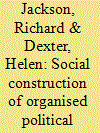|
|
|
Sort Order |
|
|
|
Items / Page
|
|
|
|
|
|
|
| Srl | Item |
| 1 |
ID:
131759


|
|
|
|
|
| Publication |
2014.
|
| Summary/Abstract |
This article proposes a general analytical framework for how we might better understand intrastate war and related forms of organised political violence. It begins by setting out our understanding of agency and structure, before outlining the key structures and agents central to the social construction of political violence. This is followed by a discussion of some of the common discursive practices frequently observed in the lead-up to the outbreak of organised violence, such as the widespread articulation of threat and victimhood narratives, the demonisation and dehumanisation of an enemy other, the renegotiation of norms of violence and the suppression of counter-hegemonic and anti-violence voices. The article argues that organised and sustained political violence is contingent on two key facilitating conditions. First, the presence of a particular set of material and discursive structures, including the military instruments for sustained violence, an economic basis for prosecuting war and a set of society-wide military norms, values and practices; and second, willing and capable agents who can transform the structural potential of the society or group into active participants in violence. The interaction of structures, agents and discursive practices can, in particular historical and spatial contexts, create the specific conditions which make organised violence possible. The discussion is illustrated by reference to a number of recent and historical wars, including the war on terror
|
|
|
|
|
|
|
|
|
|
|
|
|
|
|
|
| 2 |
ID:
131707


|
|
|
|
|
| Publication |
2014.
|
| Summary/Abstract |
Conventional understandings of security cooperation are rooted in the state-centric and materialist assumptions dominant in the Cold War and subscribe to the dictum of the Reagan years, 'trust but verify'. In today's more complex setting, however, governance arrangements with the most potential to address constantly mutating security threats, such as the concern over nuclear terrorism, may not be those solely designed to ensure compliance, but rather those that are better equipped to identify and solve new problems. This article draws on a burgeoning literature on 'new' or 'experimental' governance and advances an analytical framework to consider the extent to which states and other actors might be turning toward an alternative set of mechanisms that rely more heavily on non-binding standards and recommendations, peer review, increased participation, and experimentation to generate new knowledge about the challenges they face, even in the 'hard' case of security cooperation. It then explores this potential reorientation in two separate, but complementary cases that have emerged as key tools in preventing illicit nuclear proliferation: the Financial Action Task Force on Money Laundering (FATF), which seeks to bolster states' counter-financing of terrorism systems, and the UNSC Resolution 1540 Committee, which guides efforts to fill the governance gaps in the nuclear non-proliferation regime. Although both cases on paper contain more traditional enforcement components, in practice they rely increasingly on experimental governance. The article concludes with an evaluation of the promise and limits of an experimentalist framework in understanding the evolution of governance arrangements in response to a more complex security environment and suggests potential avenues for future research.
|
|
|
|
|
|
|
|
|
|
|
|
|
|
|
|
|
|
|
|
|